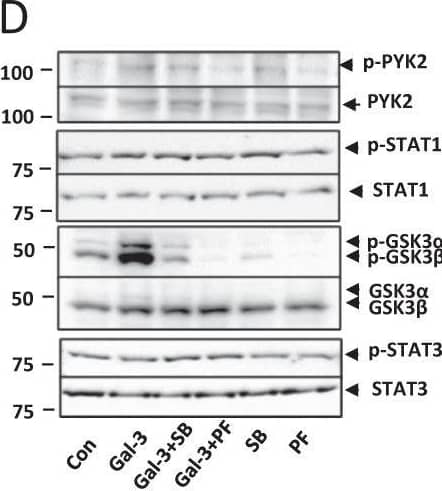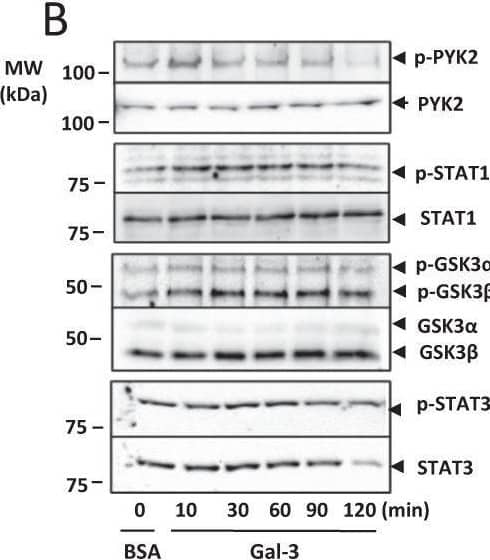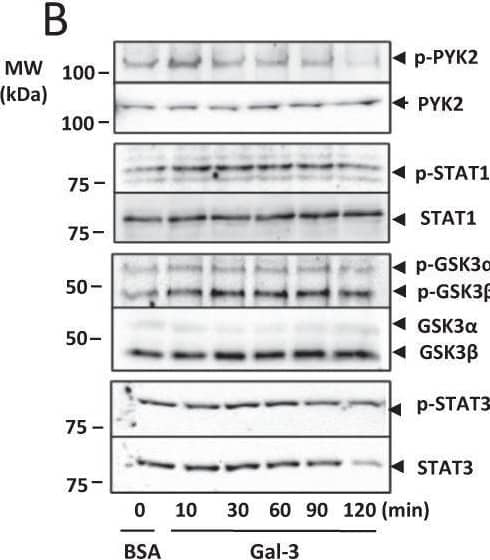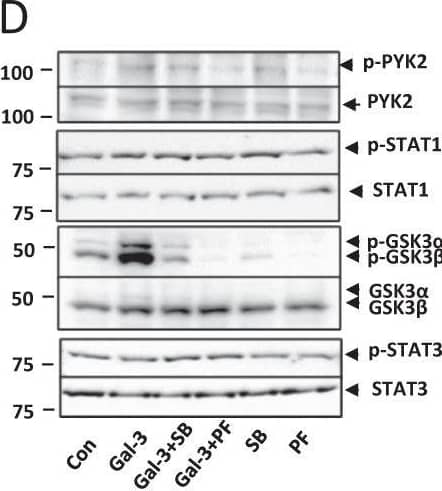Human/Mouse/Rat Phospho-GSK-3 alpha / beta (S21/S9) Antibody
Human/Mouse/Rat Phospho-GSK-3 alpha / beta (S21/S9) Antibody Summary
*Small pack size (-SP) is supplied either lyophilized or as a 0.2 µm filtered solution in PBS.
Applications
Please Note: Optimal dilutions should be determined by each laboratory for each application. General Protocols are available in the Technical Information section on our website.
Scientific Data
 View Larger
View Larger
Detection of Human Phospho-GSK‑3 alpha (S21) and GSK-3 beta (S9) by Western Blot. Western blot shows lysates of HeLa human cervical epithelial carcinoma cell line untreated (-) or treated (+) with 200 nM PMA for 20 minutes and MCF-7 human breast cancer cell line untreated or treated with 100 ng/mL Recombinant Human IGF-1 (291-G1) for 15 minutes. PVDF membrane was probed with 0.2 µg/mL of Human/Mouse/Rat Phospho-GSK-3a/ beta (S21/S9) Antigen Affinity-purified Polyclonal Antibody (Catalog # AF1590), followed by HRP-conjugated Anti-Rabbit IgG Secondary Antibody (HAF008). Specific bands were detected for Phospho-GSK-3a (S21) and GSK-3 beta (S9) at approximately 51 and 46 kDa (as indicated). This experiment was conducted under reducing conditions and using Immunoblot Buffer Group 1.
 View Larger
View Larger
Phospho-GSK‑3 alpha / beta (S21/S9) in HeLa Human Cell Line. Phospho-GSK‑3 alpha / beta (S21/S9) was detected in immersion fixed HeLa human cervical epithelial carcinoma cell line treated with PMA (left panel; positive staining) and untreated HeLa cell line (right panel; negative control) using Rabbit Anti-Human/Mouse/Rat Phospho-GSK‑3 alpha / beta (S21/S9) Antigen Affinity-purified Polyclonal Antibody (Catalog # AF1590) at 8 µg/mL for 3 hours at room temperature. Cells were stained using the NorthernLights™ 557-conjugated Anti-Rabbit IgG Secondary Antibody (red; NL004) and counterstained with DAPI (blue). Specific staining was localized to nuclei. Staining was performed using our protocol for Fluorescent ICC Staining of Non-adherent Cells.
 View Larger
View Larger
Detection of Rat GSK-3 alpha/beta by Western Blot HYS-32 modulates GSK3 beta phosphorylation.(A) Cell lysates from control astrocytes (Con) or astrocytes treated for 2, 6, 12, or 24 h with 5 μM HYS-32 were subjected to 10% SDS-PAGE, and analyzed by immunoblotting with antibodies against GSK3 beta -pTyr216, GSK3 beta -pSer9, or GAPDH. (B) Densitometric analyses of GSK3 beta -pTyr216 and GSK3 beta -pSer9 expressed as the density of the bands in the treated groups relative to the control. *p<0.05 compared to control using one-way ANOVA with Dunnett’s post-hoc test. The results were collected from five independent experiments. (C) According to the data in (B), the stacked bar graph showing the relative percentage of phospho-GSK3 beta at indicated time. Image collected and cropped by CiteAb from the following publication (https://dx.plos.org/10.1371/journal.pone.0126217), licensed under a CC-BY license. Not internally tested by R&D Systems.
 View Larger
View Larger
Detection of Rat GSK-3 alpha/beta by Western Blot LY294002 inhibits the HYS-32-induced phosphorylation of GSK3 beta -pS9 and GSK3 beta -pY216.(A) Control astrocytes (Con) or astrocytes treated for 24 h with 5 μM HYS-32 (HYS), co-treated for 24 h with 5 μM HYS-32 and 20 μM LY294002 (HYS+LY), or treated with 20 μM LY294002 (LY) were subjected to 10% SDS-PAGE, and analyzed by immunoblotting with antibodies against GSK3 beta -pSer9, GSK3 beta -pY216, totalGSK3 beta, or GAPDH. (B) Densitometric analyses of GSK3 beta -pSer9 and GSK3 beta -pY216 expressed as the density of the bands in the treated groups relative to the control. (C) According to the data in (B), the stacked bar graph showing relative percentage ofphospho-GSK3 beta in various treatment. (D)Astrocytes treated as in (A) were fixed in cold acetone and triple-stained for beta -tubulin, N-cadherin, and F-actin. Quantitative analysis of the straight distance between microtubule tips and cell border were performed as described in Materials and Methods. The results were collected from three independent experiments.*p<0.01 compared to HYS using one-way ANOVA with Dunnett’s post-hoctest. Image collected and cropped by CiteAb from the following publication (https://dx.plos.org/10.1371/journal.pone.0126217), licensed under a CC-BY license. Not internally tested by R&D Systems.
 View Larger
View Larger
Detection of Phospho-GSK-3 alpha/ beta (S21/S9) by Western Blot Galectin-3 expression induces activation of PYK2, STAT1 and GSK3 alpha / beta signalling. Expression of 37 protein kinases in SW620 cells in response to 10 µg/ml galectin-3 or BSA for 0.5 h was assessed by Proteome Profiler Human Phospho-Kinase Array (A, Percentage changes of the kinases in cell response to galectin-3 in comparison to control are shown at the bottom panel). The presence of galectin-3 increases the phosphorylation of PYK2, GSK3 alpha / beta, and STAT1 and decreases phosphorylation of STAT3. SW620 cells treated with 10 µg/ml galectin-3 for different times were assessed by immunoblotting using antibodies against p-PYK2, p-STAT-1, p-GSK3 alpha / beta or p-STAT-3 (B). The blots were striped and reprobed with antibodies against PYK2, STAT-1, GSK3 alpha / beta or STAT-3. The band density was quantified and expressed as percentages of phospho-/non-phosphorylated proteins (C). In D and E, SW620 cells were treated with 10 µg/ml galectin-3 or BSA followed by introduction of GSK3 alpha / beta inhibitor SB 216763 (SB) or PKY2 inhibitor PF-431396 (PF) for 15 min and the levels of phosphorylated PYK2, STAT-1, GSK3 alpha / beta or STAT-3 were analysed by immunoblotting. The blots were striped and reprobed with antibodies against PYK2, STAT-1, GSK3 alpha / beta or STAT-3. The densities of the blots from three independent experiments were quantified and are expressed as the percentage of phosphorylated/non-phosphorylated levels of each protein. ***P < 0.001, **P < 0.01, *P < 0.05 (ANOVA). Image collected and cropped by CiteAb from the following open publication (https://pubmed.ncbi.nlm.nih.gov/37055381), licensed under a CC-BY license. Not internally tested by R&D Systems.
 View Larger
View Larger
Detection of Phospho-GSK-3 alpha/ beta (S21/S9) by Western Blot Galectin-3 expression induces activation of PYK2, STAT1 and GSK3 alpha / beta signalling. Expression of 37 protein kinases in SW620 cells in response to 10 µg/ml galectin-3 or BSA for 0.5 h was assessed by Proteome Profiler Human Phospho-Kinase Array (A, Percentage changes of the kinases in cell response to galectin-3 in comparison to control are shown at the bottom panel). The presence of galectin-3 increases the phosphorylation of PYK2, GSK3 alpha / beta, and STAT1 and decreases phosphorylation of STAT3. SW620 cells treated with 10 µg/ml galectin-3 for different times were assessed by immunoblotting using antibodies against p-PYK2, p-STAT-1, p-GSK3 alpha / beta or p-STAT-3 (B). The blots were striped and reprobed with antibodies against PYK2, STAT-1, GSK3 alpha / beta or STAT-3. The band density was quantified and expressed as percentages of phospho-/non-phosphorylated proteins (C). In D and E, SW620 cells were treated with 10 µg/ml galectin-3 or BSA followed by introduction of GSK3 alpha / beta inhibitor SB 216763 (SB) or PKY2 inhibitor PF-431396 (PF) for 15 min and the levels of phosphorylated PYK2, STAT-1, GSK3 alpha / beta or STAT-3 were analysed by immunoblotting. The blots were striped and reprobed with antibodies against PYK2, STAT-1, GSK3 alpha / beta or STAT-3. The densities of the blots from three independent experiments were quantified and are expressed as the percentage of phosphorylated/non-phosphorylated levels of each protein. ***P < 0.001, **P < 0.01, *P < 0.05 (ANOVA). Image collected and cropped by CiteAb from the following open publication (https://pubmed.ncbi.nlm.nih.gov/37055381), licensed under a CC-BY license. Not internally tested by R&D Systems.
 View Larger
View Larger
Detection of Phospho-GSK-3 alpha/ beta (S21/S9) by Western Blot Galectin-3 expression induces activation of PYK2, STAT1 and GSK3 alpha / beta signalling. Expression of 37 protein kinases in SW620 cells in response to 10 µg/ml galectin-3 or BSA for 0.5 h was assessed by Proteome Profiler Human Phospho-Kinase Array (A, Percentage changes of the kinases in cell response to galectin-3 in comparison to control are shown at the bottom panel). The presence of galectin-3 increases the phosphorylation of PYK2, GSK3 alpha / beta, and STAT1 and decreases phosphorylation of STAT3. SW620 cells treated with 10 µg/ml galectin-3 for different times were assessed by immunoblotting using antibodies against p-PYK2, p-STAT-1, p-GSK3 alpha / beta or p-STAT-3 (B). The blots were striped and reprobed with antibodies against PYK2, STAT-1, GSK3 alpha / beta or STAT-3. The band density was quantified and expressed as percentages of phospho-/non-phosphorylated proteins (C). In D and E, SW620 cells were treated with 10 µg/ml galectin-3 or BSA followed by introduction of GSK3 alpha / beta inhibitor SB 216763 (SB) or PKY2 inhibitor PF-431396 (PF) for 15 min and the levels of phosphorylated PYK2, STAT-1, GSK3 alpha / beta or STAT-3 were analysed by immunoblotting. The blots were striped and reprobed with antibodies against PYK2, STAT-1, GSK3 alpha / beta or STAT-3. The densities of the blots from three independent experiments were quantified and are expressed as the percentage of phosphorylated/non-phosphorylated levels of each protein. ***P < 0.001, **P < 0.01, *P < 0.05 (ANOVA). Image collected and cropped by CiteAb from the following open publication (https://pubmed.ncbi.nlm.nih.gov/37055381), licensed under a CC-BY license. Not internally tested by R&D Systems.
 View Larger
View Larger
Detection of Phospho-GSK-3 alpha/ beta (S21/S9) by Western Blot Galectin-3 expression induces activation of PYK2, STAT1 and GSK3 alpha / beta signalling. Expression of 37 protein kinases in SW620 cells in response to 10 µg/ml galectin-3 or BSA for 0.5 h was assessed by Proteome Profiler Human Phospho-Kinase Array (A, Percentage changes of the kinases in cell response to galectin-3 in comparison to control are shown at the bottom panel). The presence of galectin-3 increases the phosphorylation of PYK2, GSK3 alpha / beta, and STAT1 and decreases phosphorylation of STAT3. SW620 cells treated with 10 µg/ml galectin-3 for different times were assessed by immunoblotting using antibodies against p-PYK2, p-STAT-1, p-GSK3 alpha / beta or p-STAT-3 (B). The blots were striped and reprobed with antibodies against PYK2, STAT-1, GSK3 alpha / beta or STAT-3. The band density was quantified and expressed as percentages of phospho-/non-phosphorylated proteins (C). In D and E, SW620 cells were treated with 10 µg/ml galectin-3 or BSA followed by introduction of GSK3 alpha / beta inhibitor SB 216763 (SB) or PKY2 inhibitor PF-431396 (PF) for 15 min and the levels of phosphorylated PYK2, STAT-1, GSK3 alpha / beta or STAT-3 were analysed by immunoblotting. The blots were striped and reprobed with antibodies against PYK2, STAT-1, GSK3 alpha / beta or STAT-3. The densities of the blots from three independent experiments were quantified and are expressed as the percentage of phosphorylated/non-phosphorylated levels of each protein. ***P < 0.001, **P < 0.01, *P < 0.05 (ANOVA). Image collected and cropped by CiteAb from the following open publication (https://pubmed.ncbi.nlm.nih.gov/37055381), licensed under a CC-BY license. Not internally tested by R&D Systems.
Reconstitution Calculator
Preparation and Storage
- 12 months from date of receipt, -20 to -70 °C as supplied.
- 1 month, 2 to 8 °C under sterile conditions after reconstitution.
- 6 months, -20 to -70 °C under sterile conditions after reconstitution.
Background: GSK-3 alpha/beta
GSK-3 is a Ser/Thr kinase first identified as an inactivator of Glycogen Synthase. GSK-3 acts as a multifunctional downstream switch that determines the output of numerous signaling pathways. There are two mammalian GSK-3 isoforms encoded by distinct genes, GSK-3 alpha and GSK-3 beta, which are structurally similar, but functionally non-identical. GSK-3a is inhibited by phosphorylation at S21 by Akt and other kinases. GSK-3 alpha and GSK-3 beta share 85% amino acid identity. Dysregulated GSK-3 has been implicated in several diseases including type II diabetes, Alzheimer's disease, bipolar disorder, and cancer.
Product Datasheets
Citations for Human/Mouse/Rat Phospho-GSK-3 alpha / beta (S21/S9) Antibody
R&D Systems personnel manually curate a database that contains references using R&D Systems products. The data collected includes not only links to publications in PubMed, but also provides information about sample types, species, and experimental conditions.
12
Citations: Showing 1 - 10
Filter your results:
Filter by:
-
Musashi 1-positive cells derived from mouse embryonic stem cells treated with LY294002 are prone to differentiate into intestinal epithelial-like tissues
Authors: Lan, SY;Tan, MA;Yang, SH;Cai, JZ;Chen, B;Li, PW;Fan, DM;Liu, FB;Yu, T;Chen, QK;
Int. J. Mol. Med.
-
Inhibition of inflammatory osteoclasts accelerates callus remodeling in osteoporotic fractures by enhancing CGRP+TrkA+ signaling
Authors: Shu, Y;Tan, Z;Pan, Z;Chen, Y;Wang, J;He, J;Wang, J;Wang, Y;
Cell death and differentiation
Species: Transgenic Mouse
Sample Types: Cell Lysates
Applications: Western Blot -
Multiscale networks in multiple sclerosis
Authors: Kennedy, KE;Kerlero de Rosbo, N;Uccelli, A;Cellerino, M;Ivaldi, F;Contini, P;De Palma, R;Harbo, HF;Berge, T;Bos, SD;Høgestøl, EA;Brune-Ingebretsen, S;de Rodez Benavent, SA;Paul, F;Brandt, AU;Bäcker-Koduah, P;Behrens, J;Kuchling, J;Asseyer, S;Scheel, M;Chien, C;Zimmermann, H;Motamedi, S;Kauer-Bonin, J;Saez-Rodriguez, J;Rinas, M;Alexopoulos, LG;Andorra, M;Llufriu, S;Saiz, A;Blanco, Y;Martinez-Heras, E;Solana, E;Pulido-Valdeolivas, I;Martinez-Lapiscina, EH;Garcia-Ojalvo, J;Villoslada, P;
PLoS computational biology
Species: Human
Sample Types: Whole Cells
Applications: Flow Cytometry -
Single-Cell Spatial MIST for Versatile, Scalable Detection of Protein Markers
Authors: Meah, A;Vedarethinam, V;Bronstein, R;Gujarati, N;Jain, T;Mallipattu, SK;Li, Y;Wang, J;
Biosensors
Species: Mouse
Sample Types: Complex Sample Type
Applications: IHC -
Galectin-3 promotes secretion of proteases that decrease epithelium integrity in human colon cancer cells
Authors: S Li, DM Pritchard, LG Yu
Cell Death & Disease, 2023-04-13;14(4):268.
Species: Human
Sample Types: Cell Lysates
Applications: Western Blot -
Chronic colitis upregulates microRNAs suppressing brain-derived neurotrophic factor in the adult heart
Authors: Y Tang, KT Kline, XS Zhong, Y Xiao, H Lian, J Peng, X Liu, DW Powell, G Tang, Q Li
PLoS ONE, 2021-09-20;16(9):e0257280.
Species: Rat
Sample Types: Tissue Homogenates
Applications: Western Blot -
Cathepsin V suppresses GATA3 protein expression in luminal A breast cancer
Authors: Naphannop Sereesongsaeng, Sara H. McDowell, James F. Burrows, Christopher J. Scott, Roberta E. Burden
Breast Cancer Research
-
Chemotherapy induced PRL3 expression promotes cancer growth via plasma membrane remodeling and specific alterations of caveolae-associated signaling
Authors: Balint Csoboz, Imre Gombos, Eniko Tatrai, Jozsef Tovari, Anna L. Kiss, Ibolya Horvath et al.
Cell Communication and Signaling
-
HYS-32-Induced Microtubule Catastrophes in Rat Astrocytes Involves the PI3K-GSK3beta Signaling Pathway.
Authors: Chiu C, Liao C, Shen C, Tang T, Jow G, Wang H, Wu J
PLoS ONE, 2015-05-04;10(5):e0126217.
Species: Rat
Sample Types: Cell Lysates
Applications: Western Blot -
Mycobacteria bypass mucosal NF-kB signalling to induce an epithelial anti-inflammatory IL-22 and IL-10 response.
Authors: Lutay N, Hakansson G, Alaridah N, Hallgren O, Westergren-Thorsson G, Godaly G
PLoS ONE, 2014-01-28;9(1):e86466.
Species: Human
Sample Types: Cell Lysates
Applications: Western Blot -
Mechanical induction of PGE2 in osteocytes blocks glucocorticoid-induced apoptosis through both the beta-catenin and PKA pathways.
Authors: Kitase Y, Barragan L, Qing H, Kondoh S, Jiang JX, Johnson ML, Bonewald LF
J. Bone Miner. Res., 2010-06-24;25(12):2381-92.
Species: Mouse
Sample Types: Cell Lysates
Applications: Western Blot -
Survival effect of PDGF-CC rescues neurons from apoptosis in both brain and retina by regulating GSK3beta phosphorylation.
Authors: Tang Z, Arjunan P, Lee C, Li Y, Kumar A, Hou X, Wang B, Wardega P, Zhang F, Dong L, Zhang Y, Zhang SZ, Ding H, Fariss RN, Becker KG, Lennartsson J, Nagai N, Cao Y, Li X
J. Exp. Med., 2010-03-15;207(4):867-80.
Species: Rat
Sample Types: Cell Lysates
Applications: Western Blot
FAQs
No product specific FAQs exist for this product, however you may
View all Antibody FAQsReviews for Human/Mouse/Rat Phospho-GSK-3 alpha / beta (S21/S9) Antibody
Average Rating: 5 (Based on 1 Review)
Have you used Human/Mouse/Rat Phospho-GSK-3 alpha / beta (S21/S9) Antibody?
Submit a review and receive an Amazon gift card.
$25/€18/£15/$25CAN/¥75 Yuan/¥2500 Yen for a review with an image
$10/€7/£6/$10 CAD/¥70 Yuan/¥1110 Yen for a review without an image
Filter by:













